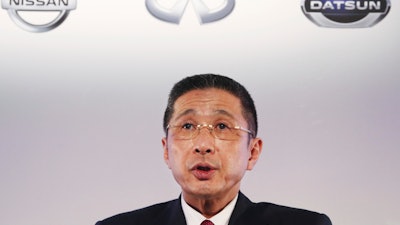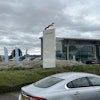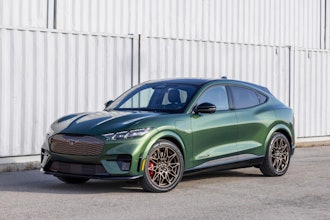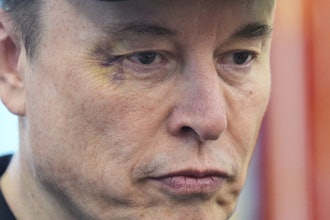
Japanese automaker Nissan, reeling from the arrest of its former chairman Carlos Ghosn, reported Tuesday that its annual profit nose-dived to less than half of what it earned the previous year, and forecast even dimmer results going forward.
Nissan Motor Co.'s profit for the fiscal year that ended in March totaled 319.1 billion yen ($2.9 billion), down from 746.9 billion yen the previous fiscal year — its worst showing since the global financial crisis a decade ago.
Nissan said profit for the fiscal year through March 2020 will drop to 170 billion yen ($1.5 billion), as its earnings are slammed by restructuring and product development expenses combined with currency-related losses and rising material costs.
"This is a very critical situation," Nissan's chief executive, Hiroto Saikawa, told reporters at its headquarters in Yokohama.
He said efforts were underway to reshape Nissan's business, especially in North America, where profits have dropped because of incentives and over production.
Nissan's sales for the fiscal year totaled 11.6 trillion yen ($105 billion), down 3% from the previous fiscal year. Vehicle sales for the fiscal year slipped 4% to 5.5 million. Nissan did not break down quarterly results.
Saikawa promised that Nissan's business will be turned around over the next two or three years. He blamed what he called an overly aggressive sales growth strategy spearheaded by Ghosn, though Saikawa himself has faced criticism over his leadership since he became CEO in 2017.
Saikawa apologized to customers and shareholders for the shoddy results, giving a short bow rather than the usual deep bow held for nearly a minute by Japanese executives apologizing for corporate wrongdoing.
Ghosn, who led Nissan and its alliance with Renault SA of France for two decades, was arrested in November on financial misconduct charges. He has been accused of under-reporting retirement compensation, having Nissan shoulder investment losses and diverting Nissan money for personal gain.
On Tuesday, Tokyo prosecutors said they had amended one of their indictments against Ghosn to include an allegation that he received $20 million from a Saudi Arabian businessman in connection with a currency swap deal cited in a charge of breach of trust.
He says he is innocent. He says the compensation was never paid or agreed upon, the losses were never suffered and the payments were for legitimate services.
Ghosn has expressed concern over Nissan's operations, saying its current leadership lacks vision.
The scandal over Ghosn's arrest and dismissal added to Nissan's problems. It logged 9.2 billion yen ($83 million) in costs for the fiscal year through March from alleged underreporting of Ghosn's compensation. Some analysts say the brand has been tarnished.
It is unclear when Ghosn's trial will start, as preparations in Japan take months. Prosecutors wanted Ghosn kept incarcerated during the preparation, but he was released on bail in March, rearrested and then released again in April.
The latest release forbids Ghosn, a Brazilian-born Frenchman of Lebanese ancestry, from contact with his wife, a restriction that prosecutors have defended as necessary to prevent evidence tampering.
Saikawa brushed off speculation that Renault may be pushing for a merger, saying Renault Chairman Jean-Dominique Senard, who recently joined Nissan's board, agrees that fixing Nissan comes first.
Renault owns 43% of Nissan. Nissan, which makes the Leaf electric car, March subcompact and Infiniti luxury models, owns 15% of Renault.
Saikawa also brushed off a reporter's question about his resignation. He said he planned to hand over the reins to another leader "when the timing is right."
For now, he said, he needs to focus on a turnaround.






















